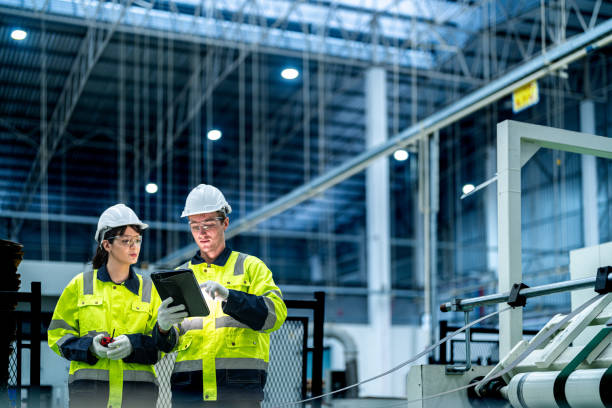Modular Manufacturing: Revolutionizing Production Flexibility
The manufacturing landscape is undergoing a profound transformation, with modular manufacturing emerging as a game-changing approach. This innovative methodology promises to redefine production flexibility, allowing businesses to adapt swiftly to market demands and technological advancements. By breaking down production processes into interchangeable, standardized units, modular manufacturing offers a level of agility previously unattainable in traditional manufacturing settings. This article delves into the principles, benefits, and challenges of modular manufacturing, exploring its potential to reshape industrial operations across various sectors.

As global competition intensified and consumer preferences became more diverse, manufacturers sought more flexible production methods. The advent of computer-aided design (CAD) and advanced robotics in the late 20th century paved the way for more sophisticated modular manufacturing systems. These technological advancements allowed for the creation of standardized, interchangeable modules that could be easily reconfigured to produce different products or accommodate new processes.
Core Principles of Modular Manufacturing
At its heart, modular manufacturing is built on several key principles that distinguish it from traditional manufacturing approaches:
-
Standardization: Modules are designed to be interchangeable and compatible across different production lines.
-
Flexibility: Production systems can be quickly reconfigured to accommodate new products or processes.
-
Scalability: Capacity can be easily increased or decreased by adding or removing modules.
-
Maintainability: Individual modules can be replaced or upgraded without disrupting the entire production line.
-
Reusability: Modules can be repurposed for different products or production processes, reducing waste and increasing efficiency.
These principles work in concert to create a manufacturing ecosystem that is both highly efficient and incredibly adaptable to changing market conditions.
The Impact on Production Efficiency
Modular manufacturing has the potential to significantly enhance production efficiency in several ways:
-
Reduced Setup Times: With standardized modules, changeovers between different products can be accomplished much more quickly than in traditional manufacturing setups.
-
Improved Quality Control: Standardized modules allow for more consistent quality across production runs, as each module can be individually tested and optimized.
-
Faster Time-to-Market: New products can be introduced more rapidly by reconfiguring existing modules rather than designing entirely new production lines.
-
Enhanced Customization: Modular systems can more easily accommodate product variations and customizations without significant retooling.
-
Optimized Resource Allocation: Resources can be quickly reallocated to different production lines as demand shifts, maximizing overall plant efficiency.
These efficiency gains translate into tangible benefits for manufacturers, including reduced costs, improved responsiveness to market demands, and increased competitiveness.
Challenges in Implementing Modular Manufacturing
While the benefits of modular manufacturing are compelling, its implementation is not without challenges:
-
Initial Investment: Transitioning to a modular system often requires significant upfront costs in redesigning production processes and acquiring new equipment.
-
Standardization Complexity: Developing standardized modules that can be used across different products and processes can be a complex and time-consuming process.
-
Workforce Training: Employees need to be trained in new skills to operate and maintain modular systems effectively.
-
Supply Chain Integration: Modular manufacturing may require changes to supply chain management to ensure the timely delivery of components for different module configurations.
-
Balancing Flexibility and Efficiency: While modularity offers flexibility, it may sometimes come at the cost of absolute efficiency for specific products compared to dedicated production lines.
Overcoming these challenges requires careful planning, strategic investment, and a commitment to long-term transformation.
Case Studies: Modular Manufacturing in Action
Several industries have successfully implemented modular manufacturing principles, demonstrating their versatility and effectiveness:
-
Automotive Industry: Major car manufacturers have adopted modular platforms that allow multiple vehicle models to be built on the same production line, significantly reducing development costs and time-to-market.
-
Electronics Manufacturing: Companies in the electronics sector use modular assembly lines to produce a wide range of consumer devices, allowing for rapid product updates and customization.
-
Pharmaceutical Production: Modular cleanrooms and production units have enabled pharmaceutical companies to quickly scale up production of new drugs and vaccines, as seen during the recent global health crisis.
-
Aerospace Manufacturing: Aircraft manufacturers have implemented modular assembly techniques to manage the complexity of modern aircraft production, improving efficiency and reducing assembly times.
These case studies highlight the adaptability of modular manufacturing across diverse industrial sectors and its potential to drive innovation and competitiveness.
Key Strategies for Implementing Modular Manufacturing
• Conduct a thorough analysis of current production processes to identify opportunities for modularization
• Invest in advanced design and simulation software to optimize module configurations
• Develop a comprehensive change management plan to guide the transition to modular manufacturing
• Prioritize employee training and development to build the necessary skills for operating modular systems
• Collaborate closely with suppliers to ensure seamless integration of modular components
• Implement robust data collection and analysis systems to continuously optimize modular production
In conclusion, modular manufacturing represents a paradigm shift in industrial production, offering unprecedented flexibility and efficiency. As businesses navigate an increasingly complex and volatile market landscape, the ability to rapidly adapt production capabilities will become a critical competitive advantage. While the transition to modular manufacturing presents challenges, the potential benefits in terms of cost reduction, faster time-to-market, and improved customization capabilities make it a compelling strategy for forward-thinking manufacturers. As technology continues to evolve, we can expect modular manufacturing principles to play an increasingly central role in shaping the future of industrial production across sectors.





